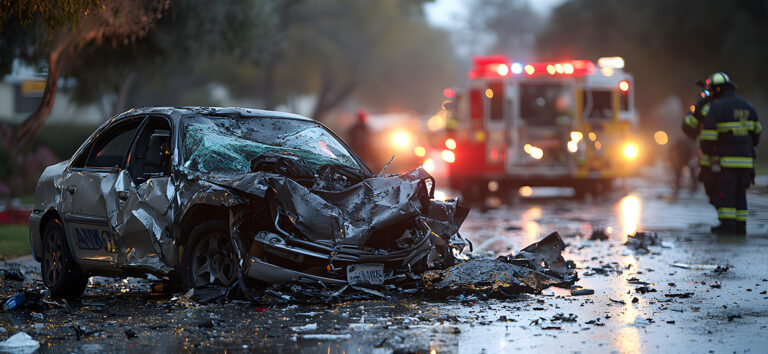Personal Injury Law
Brain, Head & Catastrophic Injury Lawyers
Personal Injury Law
Catastrophic Injury Lawyer5
Some motor vehicle accidents can be violent and traumatic, leading to serious and debilitating injuries to the survivors. Under the Ontario Statutory Accident Benefits Scheme (SABS), such injuries requiring substantial care can be considered catastrophic, entitling you to significantly higher medical rehabilitation insurance limits. It should be noted that the Ontario Statutory Accident Benefits scheme, sometimes referred to as no-fault auto insurance benefits, only provides benefits when your injury is a result of an accident involving a motor vehicle. Any severe physical or psychological trauma resulting in a serious impairment in the individual’s functioning will fall into this category. Even then, getting your compensation claims approved might prove to be an uphill task if you do not have an experienced Personal Injury lawyer fighting on your behalf.
Our Personal Injury Law services
- Occupiers’ Liability
- Dog Bite Injury
- Product Liability
- Nursing Home Negligence
- Wrongful Death
What constitutes a catastrophic injury?
The Financial Services Commission of Ontario (FSCO) conducted a study in 2011 to determine the criteria for classifying injuries as catastrophic. Their report is now considered the standard in classifying an injury as catastrophic. The following injuries meet the FSCO’s catastrophic classification criteria:
- Paraplegia, quadriplegia, or any other spinal injury categorized as severe by the American Spinal Injury Association.
- An injury resulting in permanent disability to walk independently or loss of function in both or one limb. This covers the crushing of a limb, amputation, partial amputation, and burn injuries.
- Loss of vision in both eyes.
- A traumatic brain injury in the case of an adult, where it caused a coma for at least one month, severe upper or lower disability for at least six months, or a moderate lower disability lasting one year following a brain impairment. Here the Glasgow and the Extended Glasgow Outcome Scales are followed to categorize a brain injury as catastrophic.
- A traumatic brain injury in the case of a child under 18 is designated as catastrophic if it requires hospitalization and the condition falls under the severe categories on the King’s Outcome Scale for Childhood Head Injury.
- Physical injuries or medical conditions affecting at least 55% of body functioning are also classified as catastrophic.
- Impairment from mental or behavioural problems such as severe depression or Post-Traumatic Stress Disorder (PTSD) can only be categorized as catastrophic if it meets a specific threshold for severely impaired psychosocial functioning.
- An impairment categorized as severe under the American Medical Association’s Guides to the Evaluation of Permanent Impairment, caused by a mental or psychological disorder.
The Statutory Accident Benefits Schedule (SABS) legislation in Ontario, which governs catastrophic injuries or impairment benefits, has incorporated these criteria.
How can a Personal Injury Lawyer help you?
The categorization of your injury as catastrophic pursuant to the SABS will result in you being able to access much higher insurance limits under Ontario law. Again, it must be kept in mind that the SABS only apply when injuries are sustained as a result of a motor vehicle accident. The insurance provider might try to downplay the severity of your condition to reduce the benefits you’re eligible for. As mentioned above, the criteria used to define an injury as catastrophic is highly technical. While a non-catastrophic injury entitles you to a maximum benefit amount under the SABS of $65,000 for medical and attendant care, catastrophic injuries have a maximum insurable limit under the SABS of $1 million for medical and attendant care. Therefore, you should seek the necessary legal guidance to confirm your eligibility for this benefit.
A knowledgeable Personal Injury lawyer can help you make sense of these complicated criteria and help you draft your application for the catastrophic injury claim. In the case of physical injuries like blindness or loss of function in limbs, the process may be straightforward. However, if your impairment stems from a mental disorder, you will face significant challenges, necessitating legal guidance from the outset and medical experts’ testimony to validate your claim. An individual’s negligence can cause your injury, providing grounds for a tort action against the at-fault party. Our Catastrophic Injury lawyer can help you with the legal proceedings for damages in court. The court will determine your damages based on the evidence. Follow the advice of a Personal Injury lawyer in choosing the right course of action to maximize your compensation.
Frequently Asked Questions
What are the different types of compensation available to a catastrophic injury victim under a tort civil suit?
Under the tort civil suit, you can apply for damages for the following:
- Income loss: You can claim damages for the income lost while you were recovering from your injuries.
- Reduced Earning Capacity: Your severe injuries will make it difficult for you to earn as much as before. You can claim damages for this loss of future income.
- Expenses for medical care, rehabilitation, and attendant care: Catastrophic injuries often require expensive medical treatment and lifelong care. The victim’s current physical condition will make it difficult for him to afford these expenses.
- Pain and suffering damages serve as compensation for the emotional distress the victim experienced.
- Home maintenance and housekeeping expenses.
- Special damages are intended to compensate for any additional monetary losses incurred due to the injury.
In a tort case, the judge or the jury will ultimately determine the victim’s compensation amount. If the plaintiff contributed partially to the accident, for example, if they were 50% at fault, they would only receive 50% of the value of their claim. On the other hand, if the respondent was entirely at fault, the court might award multi-million-dollar compensation to the victim. You must file your tort action within two years of the incident.
What are the types of benefits available to catastrophic injury victims injured in a motor vehicle accident pursuant to the SABS?
In the case of an accident benefits claim, the types and the amount of compensation you will receive will depend on the compensation limits under different categories set by the insurance regulations. If you look at SABS, the compensation limits are as follows:
- You are entitled to a benefit for medical care, rehabilitation, and attendant expenses up to a total of $1,000,000.
- The maximum weekly benefit for caregivers is $250.
- The weekly cap on home maintenance and housekeeping expenses is $100.
- You can claim dependent benefits up to $50 per week.
- You can claim educational expenses for a total of $15,000 to compensate for any interruptions in education.
It is required that you inform your auto insurance provider about your intention to make a claim for benefits under the SABS for injuries arising from a car accident within seven days of the date of the accident.
Is it possible to pursue both a tort action and a SAB accident benefit claim for injuries sustained in the same motor vehicle accident?
Yes. If a vehicle accident caused your catastrophic injury, you can pursue both options to maximize the amount of compensation. In fact, up until 2016, the maximum limit of compensation for accident benefits claims under SABS was $1 million for medical care and rehabilitation and another $1 million for attendant care. However, in 2016, SABS reduced this $2 million limit to $1 million for the combined expenses of medical care, rehabilitation, and attendant care. This has affected many victims who require lifelong, expensive medical care. It is best to start both proceedings rather than one. Consult our Personal Injury lawyer to figure out the best legal strategy to get the compensation you deserve.
We can Help
If you are suffering from a catastrophic injury or impairment, get in touch with our legal team today to fight for your rights and maximize your benefits.

In short: The plaintiff slipped and fell during a winter weather event...

A personal injury lawsuit holds water only when the plaintiff can prove...

The High Cost of Dishonesty in Personal Injury Law: Ont. Court of...

